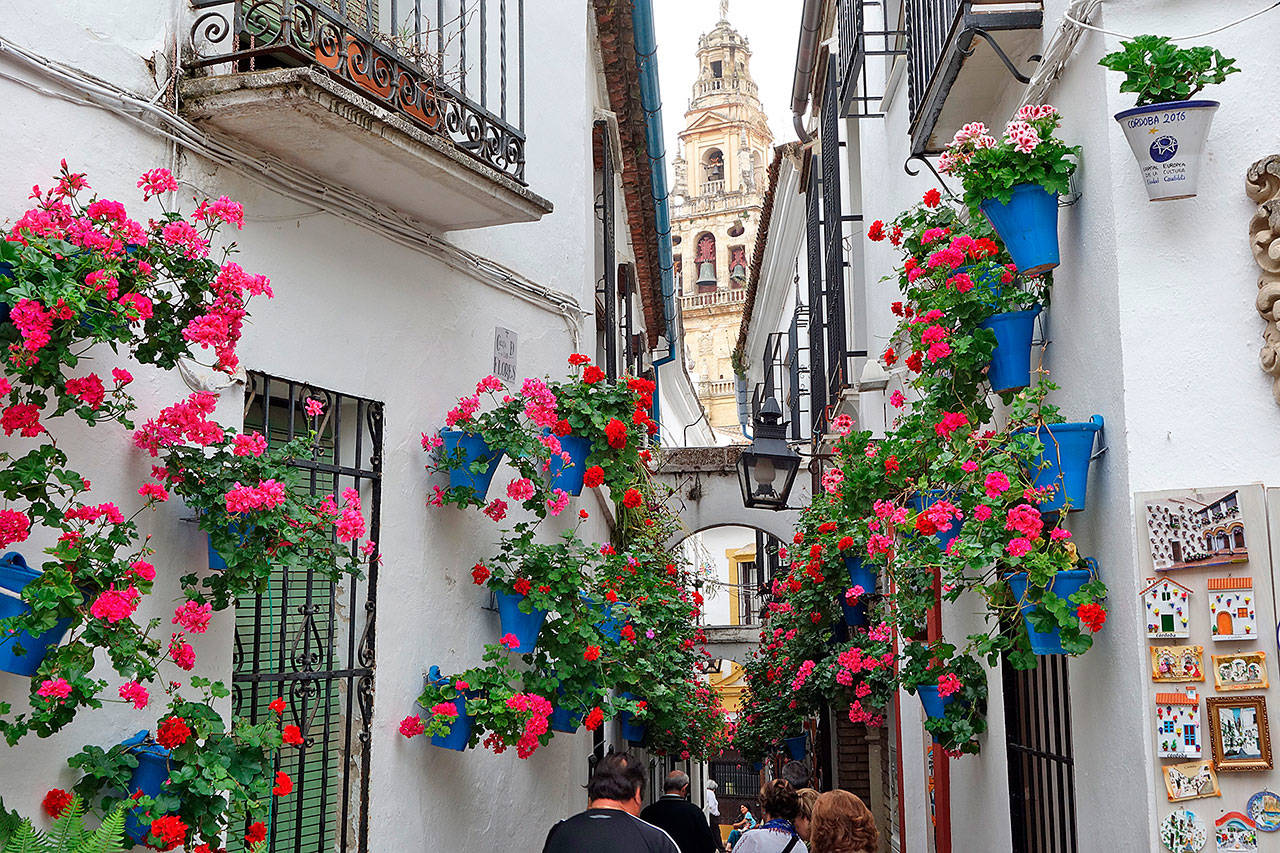As we’ve had to postpone our travels because of the pandemic, I believe a weekly dose of travel dreaming can be good medicine. Here’s one of my favorite European memories in Andalucia — a reminder of the fun that awaits us at the other end of this crisis.
Wandering the Art Deco streets of Córdoba in southern Spain, I’m drawn to a commotion on a square. It’s almost midnight and everyone’s out, savoring a cool evening. The short men around me all seem to have raspy tobacco voices and big bellies they call curvas de felicidad (happiness curves). As the men jostle and bark, parents gather, nodding with approval, as a dozen little schoolgirls rattle a makeshift stage … working on their sultry. Even with a very modern young generation, flamenco culture thrives.
Córdoba is known mostly for its Mezquita, a vast mosque with a cathedral built into its middle. The Mezquita, one of the glories of Moorish Spain, is surrounded by a zone of shops and restaurants that seems designed for big tour groups. Beyond that, there are almost no crowds. And late at night there are even fewer tourists.
Avoiding tourist crowds is important these days, especially when traveling in peak season. Because I eat late and don’t mind the smoke, I’m surrounded only by happy locals. I’ve noticed that in Spain, a restaurant recommended in all the guidebooks is filled with Americans at eight or nine o’clock, but by 10 p.m., the tourists head for their hotels and the locals retake their turf. Suddenly, “touristy” restaurants are filled with eager local diners. I’ve also noticed that some restaurateurs are pleased to have their best eating zone be the smoking zone. The intended result: a hardy local following … with very few tourists.
Just wandering the back streets leaves me all alone with the town. Exploring the residential back lanes of old Córdoba, I catch an evocative whiff of the old town before the recent affluence hit.
Streets are narrow — designed to provide much-appreciated shade. To keep things even cooler, walls are whitewashed and thick, providing a kind of natural air-conditioning. To counter the boring whitewash, doors and windows are colorful. Iron grilles providing security cover the windows — a reminder of the persistent gap through the ages between rich and poor. Stone bumpers on corners protect buildings from crazy drivers. As elsewhere in Andalucia, they’re made from scavenged ancient Roman pillars. Lanes are made of river-stone cobbles: cheap and local. In the middle of lanes are drains, flanked by smooth stones that stay dry for pedestrians. Remnants of old towers — the stubs of lopped-off minarets — survive, built into today’s structures. Muslim Córdoba peaked in the 10th century with an estimated 400,000 people … and lots of now-mostly-gone neighborhood mosques.
In Córdoba, patios are taken very seriously. That’s especially clear each May, when a fiercely competitive contest is held to pick the city’s most picturesque. Patios, a common feature of houses throughout Andalucia, have a long history here. The Romans used them to cool off and the Moors added lush, decorative touches. The patio functioned as a quiet outdoor living room, an oasis from the heat. Inside elaborate ironwork gates, roses, geraniums and jasmine spill down whitewashed walls, while fountains gargle and caged birds sing. Some patios are owned by individuals, some are communal courtyards for several homes, and some grace public buildings like museums or convents.
Today, homeowners take pride in these mini paradises, and they have no problem sharing them. As I stroll Córdoba’s back streets, I pop my head through any wooden door that’s open. The owners (who keep their inner black iron gates locked) enjoy showing off their picture-perfect patios.
Well after midnight, my cultural scavenger hunt is over and the city finally seems quiet. I climb into my bed. Just as I doze off, a noisy and multigenerational parade rumbles down the cobbled lane that I thought promised a good night’s sleep. Standing in my underwear and wrapped in the drapes, I peer secretively out my window. Below, a band of guitars and castanets with a choir of those raspy tobacco voices funnels down my narrow alley. Grandmothers — guardians of a persistent culture — make sure the children pick up their Andalusian traditions. I feel like a Peeping Tom … until one woman looks up at me, catches my eye, and seems to nod, as if satisfied that I am witnessing the persevering richness of their traditional culture.
Edmonds resident Rick Steves writes European guidebooks, hosts travel shows on public TV and radio, and organizes European tours. This article was adapted from his new book, “For the Love of Europe.” You can email Rick at rick@ricksteves.com and follow his blog on Facebook.
Talk to us
> Give us your news tips.
> Send us a letter to the editor.
> More Herald contact information.

























